Deccan Herald, Tuesday 13 November 2012
What’s holding India back? What stops India from becoming a 21st century superpower? There are ten reasons, according to author-historian, social analyst and teacher Ramachandra Guha. […]
“Adivasis do not have an effective political voice, unlike the Dalits whose voices are represented in the public domain. Adivasis in the hills and the forests have lost their land and health and have been displaced by development projects,” Guha said.
He added that tribals comprised only 15-20 percent of the country’s population.
“In states like Chhattisgarh and Jharkhand, the Dalits formed 25 percent of the population. While tribal votes mattered in 50-60 constituencies, Dalit votes played a part in nearly 300 constituencies. However, historically Dalits and Adivasis were equal partners in nation-building,” Guha said.
The unrest, coupled with corruption in the centre, compounded the situation, he analysed. […]
“In states like Chhattisgarh and Jharkhand, the Dalits formed 25 percent of the population. While tribal votes mattered in 50-60 constituencies, Dalit votes played a part in nearly 300 constituencies. However, historically Dalits and Adivasis were equal partners in nation-building,” Guha said. […]
Along with this chasm between rich and poor is the problem of environmental degradation. “Irrational water pricing has led to rampant exploitation and depletion of ground water. The soil has been contaminated by chemicals and the air is polluted.”
Source: Ramachandra Guha finds ten reasons that are holding India back
Address : http://www.deccanherald.com/content/13669/ramachandra-guha-finds-ten-reasons.html
Date Visited: Tue Nov 13 2012 19:14:54 GMT+0100 (CET)

linked to each other.” – Droupadi Murmu | Speeches by the 15th President of India >>
Images © publishers, artists & photographers featured by Google Safe Search
Learn more about water-related issues that affect India’s tribal communities >>
“Together, we must endeavour to strengthen tribal communities which are the role model in preservation of water, forest and land, and learn from their connection with nature and the surrounding environment for the sake of the entire human race.” – journalist and tribal rights activist Dayamani Barla in The Wire >>
Learn more
Bondage | Bonded labour | Human trafficking | Slavery | Zamindari
Childhood | Childrens rights: UNICEF India | Safe search
Colonial policies | Freedom Struggle | Independence
Denotified Tribe vs. “criminal tribe“
Figures, census and other statistics
Health and nutrition | Recommendations by the Expert Committee
“In fact, we still do not know to what extent global supply chains are maintained by slavery and child labor. Because of these and other factors, slavery today is more profitable than ever before, and also more woven into the global economy than ever before.” – Siddharth Kara on the persistence of modern slavery| Learn more >>
Human trafficking is a crime. To report in India, call
– Shakti Vahini +91-11-42244224, +91-9582909025 or
– Childline 1098 (national helpline)
Human Rights Commission (posts) | www.nhrc.nic.in (Government of India) >>